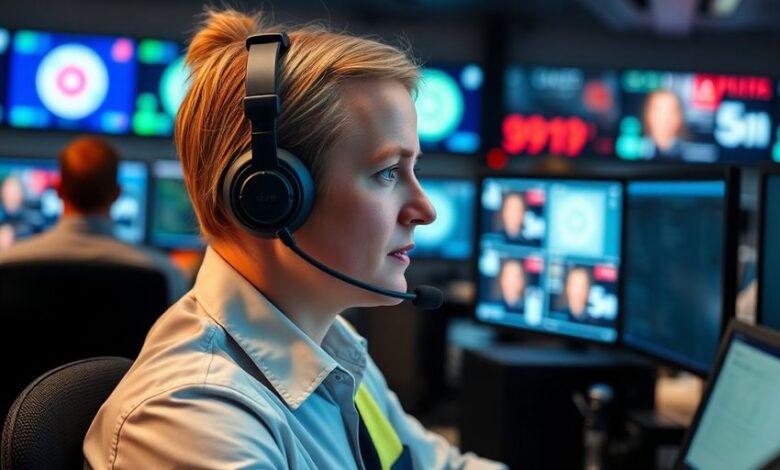Exploring 999 Call Handler Jobs: Your Path to a Rewarding Career in Emergency Services

If you’re looking for a meaningful career where you can make a real difference, becoming a 999 call handler might be the right path for you. These professionals are the first point of contact during emergencies, helping to save lives by managing critical situations and ensuring that help arrives quickly. In this article, we’ll explore what it takes to become a 999 call handler, the skills needed, the work environment, and the challenges faced in this rewarding role.
Key Takeaways
- 999 call handlers play a vital role in emergency services, acting as the first line of support during crises.
- To become a call handler, you need a good education, essential skills, and specific training programs.
- The work environment can be intense and emotionally challenging, but it is also highly rewarding.
- Career growth is possible, with opportunities for advancement and specialization in emergency services.
- Strong communication and problem-solving skills are crucial for success in 999 call handler jobs.
Understanding 999 Call Handler Jobs

Role Overview
So, what exactly does a 999 call handler do? Well, think of them as the first point of contact in an emergency. They’re the ones who answer the call, gather crucial information, and dispatch the appropriate help. It’s a fast-paced job that requires quick thinking and a calm demeanor. They are the first chain of survival in dealing with medical emergencies. You’re essentially the bridge between someone in distress and the emergency services they need. It’s more than just answering phones; it’s about making a real difference in people’s lives, often during their worst moments. The Scottish Ambulance Service provides training for this role.
Key Responsibilities
Okay, let’s break down the day-to-day stuff. A 999 call handler’s responsibilities include:
- Answering emergency calls promptly and efficiently.
- Obtaining accurate information from callers, even when they’re panicked or distressed.
- Prioritizing calls based on the severity of the situation.
- Dispatching the appropriate emergency services (police, fire, ambulance).
- Providing pre-arrival advice to callers, such as basic first aid instructions.
- Maintaining accurate records of all calls and actions taken.
It’s a lot to juggle, but it’s all about staying organized and focused. You’re not just a voice on the phone; you’re a lifeline. You’ll electronically record the details of the call, including the exact location and what happened. Then, you’ll pass the call to an emergency. You’ll need skills like initiative, communicating, curiosity, sense-making, collaborating, and focusing.
Importance in Emergency Services
Now, why are 999 call handlers so important? Because they’re the critical link in the chain of emergency response. Without them, emergency services wouldn’t know where to go or what to expect. They ensure that resources are deployed effectively and efficiently, saving valuable time and potentially lives. They help callers to provide the information needed for the best response to an emergency. Think of it this way:
A well-trained and efficient 999 call handler can make all the difference in the outcome of an emergency situation. Their ability to gather information quickly, prioritize calls accurately, and dispatch the right resources can be the difference between life and death. They are the unsung heroes of emergency services.
They are the heart of communication, managing incoming requests and coordinating the deployment of workers or vehicles to various locations. They work with paramedics, ambulance technicians, emergency dispatchers, NHS 24, other emergency call handlers, and other emergency services. The 999 operator’s role is pivotal in maintaining the flow of work and responding effectively to emergencies or changes in plans.
Pathway to Becoming a 999 Call Handler
Educational Requirements
So, you want to be a 999 call handler? Cool! It’s not always about having a fancy degree. A solid education is helpful, but it’s more about having the right skills. Most services look for a good standard of education, and some subjects can give you a leg up. Think about English, maybe human biology, math, and even geography. These can help you understand different situations and communicate effectively.
Essential Skills
Okay, let’s talk skills. It’s not just about answering the phone. You need to be a good listener, a quick thinker, and able to stay calm when things get crazy. Communication is key – you have to get information quickly and clearly. Initiative is also important, as well as being able to collaborate with others. You’ll be working with paramedics, police, and other emergency services, so teamwork is a must.
Training Programs
Once you’re in, get ready for some serious training. Most services have their own in-house programs. You’ll learn how to use the call center equipment, practice customer care, and get trained in first aid. A big part of the training involves learning how to prioritize calls and give advice over the phone using systems like the Medical Priority Dispatch System. Expect an induction week, followed by classroom training and buddying with experienced handlers. After that, you’ll be ready to fly solo!
Getting into this field isn’t easy, but it’s worth it if you’re the kind of person who wants to help people and make a difference. It’s a tough job, but it can be incredibly rewarding.
Work Environment for Call Handlers
Typical Work Settings
So, where do 999 call handlers actually work? Well, most of the time, you’ll find them in emergency call centers. These centers are usually pretty busy places, designed to handle a high volume of calls. Think lots of computers, headsets, and people working together in a coordinated effort. You might also find call handlers working in police stations, fire departments, or ambulance service headquarters, depending on the specific setup of the emergency services in that area. The key is a dedicated space with all the necessary tech to receive calls and dispatch help.
Team Dynamics
Being a 999 call handler isn’t a solo gig. It’s all about teamwork. You’re part of a team of other call handlers, supervisors, and dispatchers, all working together to get help to people who need it. Good communication is super important. You need to be able to clearly and quickly share information with your colleagues to make sure the right resources are sent to the right place. Plus, you’ll be supporting each other through some tough calls, so a strong team bond is essential.
Emotional Challenges
Let’s be real, this job isn’t always easy. You’re dealing with people who are often in distress, scared, or even injured. Hearing those calls can take an emotional toll. It’s important to have strategies for managing stress and taking care of your mental health.
Call handlers often face emotionally taxing situations. Support systems, such as counseling services and peer support groups, are often available to help manage the stress and prevent burnout. It’s a job where resilience and self-care are just as important as technical skills.
Here’s a quick look at some common emotional challenges:
- Dealing with distressed callers
- Hearing traumatic events unfold
- Managing personal emotions in high-pressure situations
Career Development Opportunities
So, you’re thinking about sticking around as a 999 call handler? Good choice! It’s not just about answering phones; there’s actually room to grow and move up. Let’s look at what your future could hold.
Advancement Paths
Okay, so you’ve mastered taking calls. What’s next? Well, a lot of places have a clear path for moving up. You might start as a trainee, then become a full call handler, and then maybe a senior call handler. After that, you could become a supervisor, overseeing a team of handlers. Some people even move into management roles, helping to shape how the whole call center runs. It really depends on the place, but usually, it involves showing you’re reliable, good at your job, and willing to take on more responsibility. Think about it: from answering calls to leading a team – that’s a pretty cool jump!
Specialization Options
Did you know you can actually specialize in certain types of calls? Some handlers focus on medical emergencies, others on police matters, and some on fire incidents. If you’re really good with kids, you might work with calls involving children. Or, if you speak another language, you could become a specialist in handling calls from people who don’t speak English well. It’s all about finding what you’re good at and what interests you. This can make the job more interesting and also make you more valuable to the service. You could even become a Call Handler Apprentice and learn the ropes.
Continuing Education
Things change, right? New technologies, new procedures… that’s why continuing education is important. Many emergency services offer ongoing training to keep their call handlers up-to-date. This might involve learning about new software, practicing how to handle different types of emergencies, or even taking courses on stress management. It’s not just about keeping your skills sharp; it’s also about showing you’re committed to doing the best job possible. Plus, some of these courses can actually help you advance in your career. It’s a win-win!
Think of it this way: every new skill you learn, every new training you complete, is like adding another tool to your toolbox. The more tools you have, the better equipped you are to handle whatever comes your way. And in a job like this, you never know what’s coming next.
Skills Required for Success
Being a 999 call handler isn’t just about answering the phone; it’s about being a lifeline in someone’s moment of crisis. It demands a unique blend of skills that go beyond the ordinary. Let’s break down what it takes to really succeed in this challenging, yet rewarding, role.
Communication Skills
Communication is absolutely key. You need to be able to actively listen, speak clearly, and convey information accurately, often under immense pressure. It’s not just about hearing what someone is saying, but understanding the urgency and emotion behind their words. This includes:
- Calmly extracting vital information from distressed callers.
- Providing clear and concise instructions.
- Using appropriate language and tone for each situation.
Problem-Solving Abilities
Call handlers are often the first point of contact in an emergency, and they need to think on their feet. This means quickly assessing the situation, prioritizing needs, and making sound decisions. It’s like being a detective, piecing together clues to dispatch the right help. Problem-solving involves:
- Analyzing information to determine the nature and severity of the emergency.
- Identifying the appropriate resources to dispatch.
- Adapting to rapidly changing circumstances.
Stress Management Techniques
This job can be incredibly stressful. You’re dealing with people in crisis, often facing life-or-death situations. It’s vital to develop healthy coping mechanisms to manage the emotional toll. Learning to manage stress is not a luxury, it’s a necessity. Some helpful techniques include:
- Practicing mindfulness and relaxation exercises.
- Seeking support from colleagues and supervisors.
- Maintaining a healthy work-life balance.
It’s important to remember that you’re not alone. Many resources are available to help call handlers manage stress and maintain their well-being. Don’t hesitate to reach out for support when you need it. There are even local daycare job opportunities that can help you find a better work-life balance.
Professional Organizations and Resources
Networking Opportunities
Getting involved with professional groups can really help your career as a 999 call handler. These groups often host events, workshops, and conferences where you can meet other people in the field. Networking is super important because it lets you share ideas, learn about new tech, and even find out about job openings that aren’t advertised yet. It’s a great way to build connections and stay up-to-date on what’s happening in emergency services.
Training Resources
Professional organizations are also great for finding training. They often have courses, certifications, and other resources to help you improve your skills. Staying on top of the latest techniques and technologies is key in this field, and these groups make it easier to do that. Plus, having extra certifications can make you stand out when you’re applying for jobs or trying to move up in your career.
Certification Programs
Getting certified in specific areas of emergency communications can really boost your career. Many professional organizations offer certification programs that show you’ve got the skills and knowledge needed to do the job well. These programs usually involve coursework, exams, and sometimes even hands-on training. Having a certification can give you more confidence and show employers that you’re serious about your work.
Being part of a professional organization can really help you grow in your role as a 999 call handler. It’s not just about the training and certifications, but also about being part of a community that supports each other and is dedicated to providing the best possible service to the public.
Challenges Faced in Call Handling

High-Pressure Situations
Okay, so imagine this: phones are ringing non-stop, people are yelling, and every second feels like it could be life or death. That’s pretty much the daily grind for a 999 call handler. The pressure to get things right, immediately, is intense. You’re dealing with situations where people are at their absolute worst, and you’ve got to stay calm and collected to get the information needed to help them. It’s not for the faint of heart, that’s for sure.
Emotional Toll
Let’s be real, hearing people in distress day in and day out takes a toll. You’re not just a robot processing information; you’re a human being listening to other human beings going through some seriously awful stuff. It’s easy to get emotionally drained, and sometimes, the things you hear can stick with you. It’s super important to have ways to cope with that, whether it’s talking to someone, doing something relaxing, or just taking a break to clear your head.
Managing Diverse Calls
One minute you might be helping someone who’s having a heart attack, and the next, you’re dealing with a minor fender-bender. The variety of calls is huge, and you’ve got to be ready for anything. You need to be able to switch gears quickly, adapt to different situations, and handle all sorts of personalities. It’s a constant learning curve, but that’s also what makes it interesting. You never really know what’s coming next.
It’s not always easy, but knowing you’re making a difference in people’s lives can make it all worthwhile. The challenges are real, but so are the rewards.
Final Thoughts on Becoming an Emergency Call Handler
So, there you have it. A job as an emergency call handler is not just about answering calls; it’s about being a lifeline for people in distress. It’s a tough gig, no doubt. You’ll need to keep your cool when things get chaotic and think on your feet. But the rewards? They’re huge. You get to make a real difference in people’s lives every single day. If you’re looking for a career that’s both challenging and fulfilling, this might just be the path for you. Whether you’re just starting out or thinking about a career change, consider giving this role a shot. You might find it’s exactly what you’ve been looking for.
Frequently Asked Questions
What does a 999 call handler do?
A 999 call handler answers emergency calls and gathers important information from the caller to help the emergency services respond effectively.
What education do I need to become a 999 call handler?
You typically need a good education, with subjects like English, Math, and Biology being helpful.
What skills are important for a call handler?
Important skills include good communication, problem-solving, and the ability to stay calm under pressure.
What kind of training do call handlers receive?
Call handlers go through a specific training program that teaches them how to use equipment, communicate well, and provide first aid.
What is the work environment like for call handlers?
Call handlers usually work in a control room and must be ready to handle high-stress situations, which can be emotionally challenging.
Are there opportunities for advancement in this career?
Yes, call handlers can advance to roles like dispatcher or supervisor and may specialize in different areas within emergency services.



